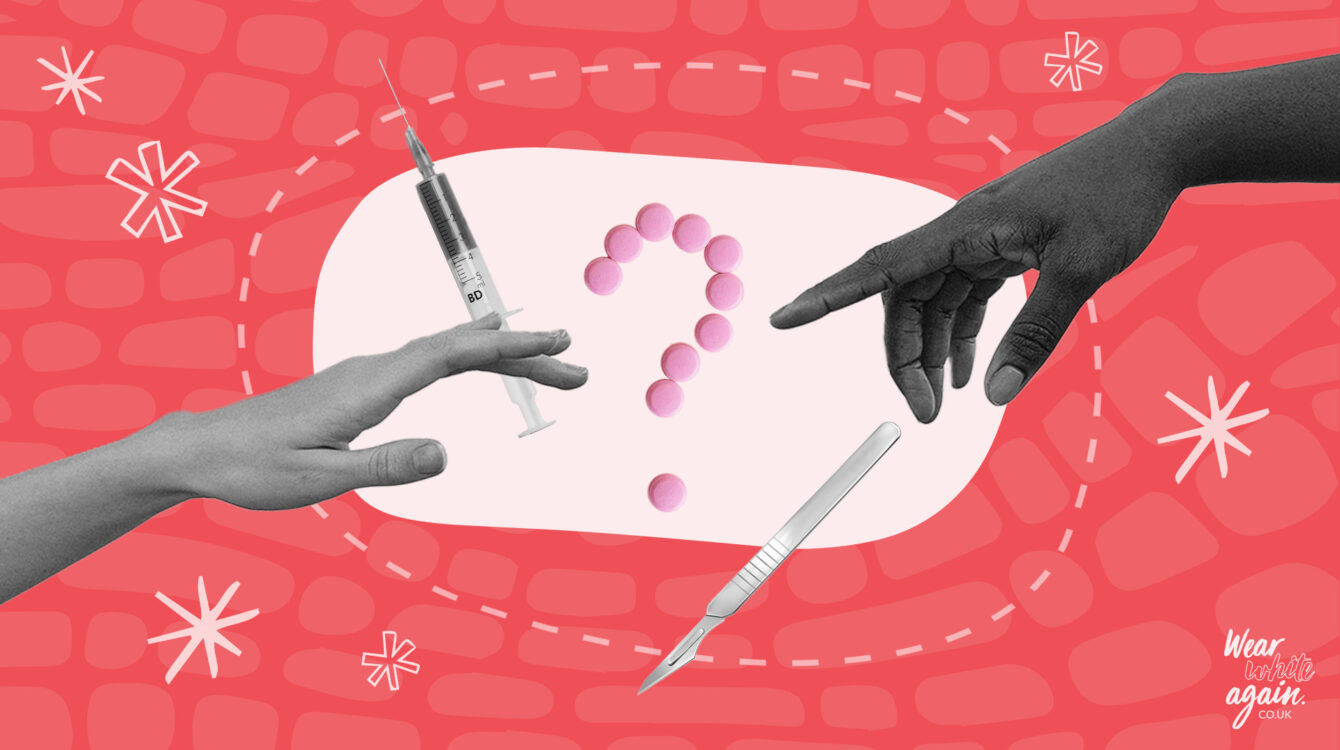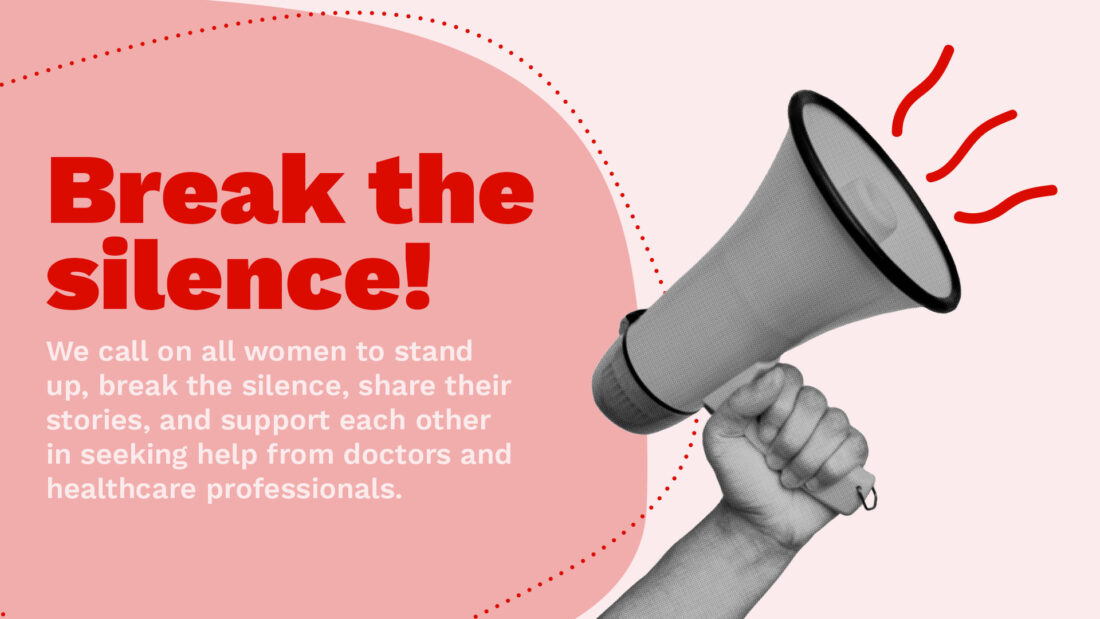
Are You Entitled to Treatment for Heavy Periods?
Last year, in 2022, GP Bas Bakx and gynaecologist Femke Wilms held a webinar with the help of our Wear White Again friends in the Netherlands1,2 to explain what Heavy Menstrual Bleeding (HMB) is and which treatment options are available via your GP and/or gynaecologist. Participants were encouraged to ask any questions in the webinar via the chat function, where Bas Bakx and Femke Wilms were happy to answer any questions.
In this blog we highlight the frequently asked questions that were discussed in this webinar regarding the theme ‘Are you entitled to treatment for heavy periods and/or referral?’

Heavy Periods Treatments & Referrals
Research shows that women with heavy menstrual bleeding hesitate when going to see a doctor or other health care professional. Despite the knowledge that attending gynaecological medical examinations are important to determine the cause of HMB and to exclude other potential health risks.
In fact, in the UK, 42% of those surveyed had not seen the GP about their heavy menstrual bleeding.3
Visiting the Doctor or Gynaecologist for HMB Symptoms

Women waiting a long time before seeking medical help was also apparent from the questions that were asked during the hosted webinar.
Questions such as: ‘A long menstrual period of more than three weeks of blood loss, could that be due to fibroids, or could this be for another reason?‘ and: ‘What could be the problem if you have blood loss for three out of four weeks?‘ were two that suggested women hadn’t yet sought treatment and dealt with heavy bleeding on their own.
Gynaecologist Femke Wilms answered:
“That could be the whole arsenal of possible causes that came up in this webinar! Three out of four weeks is really too long. That’s really abnormal. In such a case, you often see that there is an abnormality in the uterine cavity. You should definitely go to the doctor with this.”
“Should I take the doctor’s advice?”
Once in the consulting room, women often feel that they aren’t listened to. One-fifth of women (20%) surveyed in the UK stated this was a barrier to them getting treatment for heavy periods.1
Comments such as: “I have been ‘fobbed off’ by the doctor and gynaecologist a number of times and wonder if this is justified.” Unfortunately, questions such as this arose: “What to do if the gynaecologist advises living with heavy periods?”
Gynaecologist Femke Wilms:
“What a good question. There is probably a whole context behind this that I do not know and that makes it more difficult to answer this question properly. I think that there are many treatment methods possible with HMB. Although there are cases in which there are so many risk factors that a treatment poses more risk than the complaint may cause a nuisance. But I don’t think this can be a primary answer from the gynaecologist.”
“What if the GP does not want to refer me to a gynaecologist?”

If you are not satisfied with the solution offered or with the lack of a solution, it is always justified to make a new appointment. If necessary, see another doctor. “What if the GP refuses a referral to a gynaecologist?” asks one of the participants.
General practitioner Bas Bakx is clear about this:
“As doctors, we provide service. We are there because people have questions and concerns. Our job is to listen to that question as best we can. That depends on how long you’ve been to school as a doctor – so how much you know. It is the GP’s task to explain that he or she can perform many treatments himself. But people should always have the option to request a referral. Refusing a referral, that makes my ears ring. As a general practitioner, you could ask why someone would want this referral. Perhaps that person does not like internal examinations at their own GP? That’s not bad at all. I will indicate this when referred to a specialist. If a doctor refuses to hear and answer your question, I would consider another doctor.”
Be Bloody Confident

Our data shows that 47% of those that have spoken to a healthcare professional did not feel listened to and supported, with a similar number (46%) not being offered treatment for heavy periods.3 We are looking to address this issue with the help of our #BeBloodyConfident campaign.
We aim to give women the confidence to speak to their GPs and to get the HMB treatment they are entitled to. In using our period toolkit, you can go into your doctor’s office assured with the evidence needed to get answers for heavy bleeding.
Lack of education leaves women less aware of what to expect, including heavy period symptoms. More needs to be done surrounding the education of menstruation, but by opening the conversation with those around us, we can help to make a difference.
The #WearWhiteAgain downloadable and printable toolkit includes a period questionnaire, diary and treatment information. These tools will allow you to plot your bleeding over the course of 3 months, making it easy to share details of your symptoms with your GP.
Follow the Be Bloody Confident campaign on Facebook and Instagram to stay up to date.

Break the silence, it’s time to talk!
Women with Heavy Menstrual Bleeding (HMB) have to deal with very real struggles in everyday life. You rarely hear their stories, as most suffer in silence. HMB is a recognised medical condition called Menorrhagia that impacts people physically, psychologically, and socially. Yet almost half of the women still do not go to the doctor. We call on all women to stand up, break the silence, share their stories, and support each other in seeking help from doctors and healthcare professionals.
It was unfortunately not possible during the webinar to respond to specific, personal menstrual complaints. This requires knowledge of the medical file and physical examination. A webinar does not replace a medical consultation.
Disclaimer
The views and opinions expressed in this article come from third parties and do not necessarily reflect those of Hologic/Hevigbloedverlies.nl. The information is provided to clarify publicly available data and is not intended to promote specific products. The contents of this article are for informational purposes only and are not a substitute for medical advice. Always contact your doctor in case of medical problems.
Sources:
- Zorgwijzer. With thanks to DSW.
- rijksoverheid.nl[Internet]. Nederland: Rijksoverheid; page visited on 9 May 2022. Available through https://www.rijksoverheid.nl/onderwerpen/zorgverzekering/vraag-en-antwoord/wat-zit-er-in-het-basispakket-van-de-zorgverzekering
- Reference: Survey of 2,000 Women aged 18-55 plus top-up 1,000 UK women who have heavy menstrual bleeding during October 20th – 27th 2022. MISC-08708-GBR-EN
This blog is an adaptation from Wear White Again Netherlands Blog: SOM-01265-NLD-NL_001_01




